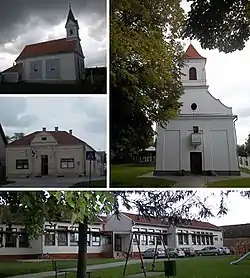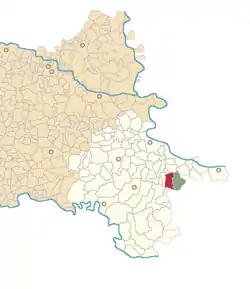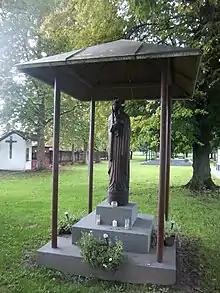Ilača
Ilača (Hungarian: Illyefő) is a village in eastern Croatia, 30 kilometres (19 mi) southeast of Vinkovci. It is connected by the D46 highway.
Ilača | |
|---|---|
 | |
 | |
 Ilača | |
| Coordinates: 45°11′N 19°06′E | |
| Country | |
| Region | Syrmia (Podunavlje) |
| County | |
| Municipality | Tovarnik |
| Elevation | 91 m (299 ft) |
| Population (2011)[2] | |
| • Total | 859 |
| Time zone | UTC+1 (CET) |
| • Summer (DST) | UTC+2 (CEST) |
Education
The village hosts a branch of Ilača–Banovci Elementary School (Croatian: Osnovna škola Ilača-Banovci).[3] Since 2002, the school administration has been based at the location in Ilača.[4] The local school in Ilača has the most students. Classes in Ilača are conducted in Croatian and in Latin script. The editorial office of the school newspaper Jeka (Echo) is also located in Ilača .
Other local schools that are part of the same administration are located in Banovci and Vinkovački Banovci.
Religion
Ilača apparitions

Ilača is the most important Catholic pilgrimage site in the historical region of Syrmia.[5] The Marian Ilača apparitions were reported in 1865, seven years after the famous Lourdes apparitions.[5] Shepard from Ilača Petar Lazin claimed that he saw a water on the middle of the field road although there was no rain, and that once he made a whole the water source started there that haven't stop since that time.[5] At the same night, another villager, young Đuka Ambrušević saw a Virgin Mary with a child in his dream and she told him that it is her water spring, that he need to build a small wall around it so that stock don't drink from it.[5] When he woke up he saw the image from his dream next to his bed.[5] Initially church authorities tried to prevent congregation from pilgrimage.[5] Later it was permitted by progressive bishop Josip Juraj Strossmayer.[6] In 1866 small chapel was built next to the spring, and in 1870 construction of a church started.[5] Ilača became target of pilgrimage for Roman Catholic Croats, Germans, Hungarians as well as for Eastern-rite Catholic Pannonian Rusyns.[5] During the Croatian War of Independence church was destroyed by tanks of Yugoslav People's Army active in the area of self-proclaimed Serbian Autonomous Oblast of SAO Eastern Slavonia, Baranja and Western Syrmia.[5] Once the UNTAES finished its peace mission in the Eastern Slavonia, Baranja and Western Syrmia in 1998 pilgrimage started once again to take place.[5]
Gallery
See also
References
- http://www.enciklopedija.hr/natuknica.aspx?id=27050
- "Population by Age and Sex, by Settlements, 2011 Census: Ilača". Census of Population, Households and Dwellings 2011. Zagreb: Croatian Bureau of Statistics. December 2012.
- "Archived copy". Archived from the original on 2016-11-29. Retrieved 2011-06-09.CS1 maint: archived copy as title (link)
- "Odluka o promjeni sjedišta Osnovne škole Ilača-Banovci" (PDF). Službeni vjesnik. Vukovar-Srijem County. 2002-05-02. Archived from the original (PDF) on 2011-07-22. Retrieved 2011-06-09.
- "Gospa Ilačka - "srijemska Gospa Lurdska"". Laudato.hr. Retrieved 6 September 2014.
- "Sedam godina nakon Lurda ukazala se Gospa na Vodici". Glas Slavonije. Retrieved 6 September 2014.


